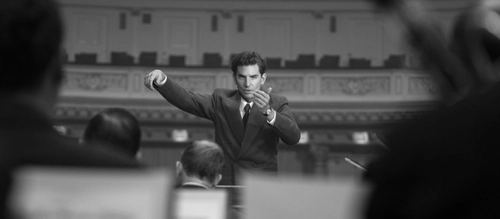Maestro (2023) Review

Maestro (2023)
Director: Bradley Cooper
Screenwriter: Bradley Cooper, Josh Singer
Starring: Bradley Cooper, Carey Mulligan, Matt Bomer, Maya Hawke, Sarah Silverman, Sam Nivola
When On the Waterfront opened in 1954, its score gained just as much critical praise as any other element of the film – which isn’t a light feat considering it won eight Oscars. Amazingly, it would remain Leonard Bernstein’s only contribution to cinema. At least, his only contribution that was intended to be part of a film – the music he composed for West Side Story is probably some of his most iconic work, but it was composed for the stage rather than for the screen. For a character as big as Bernstein with a mark on American culture of similar stature, it’s amazing to think that it has taken this long for his second mark on cinema to be made.
Bradley Cooper writes, directs, and stars in Maestro as the man himself. Cooper’s belief in his own ability to multitask is clearly quite strong, and its strength is only matched by his ambition to make a film that spans a life as long and as rich as Bernstein’s. We meet him as an old man who has already done it all, and then we take a step back into his mid-twenties in the early 1940s.
Maestro is a rare case in which style becomes substance. Bradley Cooper’s performance as Bernstein changes to fit each historical era that the film visits – he is more stagey and theatrical in the 40s, and looser and, seemingly, more improvisational in the 70s. It’s not only Cooper’s performance that changes – the cinematography changes to suit the era it’s portraying in more ways than just the use of black and white footage for the older sequences.
As Bernstein himself ages with constantly shifting makeup and facial prosthetics, the look and feel of the world around him informs us as to when it is all taking place by becoming a part of the era it’s portraying. When it’s showing us something from the 40s, it could easily be dropped into a Charlie Chaplin film, whereas the shots that take place in the 70s could be mistaken for Deliverance. In the few glimpses we get into the 80s, it has the atmosphere of a cheesy Miami-set disposable action movie.
The only aspect that isn’t changing and reinventing itself throughout is Felicia, Bernstein’s wife portrayed by Carey Mulligan. Mulligan’s performance is in such stark contrast to Cooper’s that it accentuates both of their characters – Felicia is caring and stable while Leonard is passionate and erratic. They aren’t compatible as lovers, but they share a warmth towards each other that neither takes for granted.

Bernstein is such a flawed character that, if it wasn’t for Felicia’s stability beside him, it would be hard to empathise with why he makes such chaotic life choices at every available opportunity. Maestro never advocates for those choices or attempts to put Bernstein in a light that he isn’t worthy of – it’s as critical of him as it needs to be – but seeing how quickly his personality and his life can change does go some way to creating some relatability for how he could become so self-destructive. A kind light is encouraged by the wealth of context that we’re afforded.
Of course, Maestro isn’t breaking new ground in telling quite a personal story in contrast to an otherwise well-crafted public image. Tár even beat it to be the first one about a conductor to be released in the 2020s. The best comparison for Maestro, however, is probably in something it’s the opposite of, The Greatest Showman. They’re both films about Americans who broke new ground in their respective eras – the former as the first American to lead a symphony orchestra and the latter as the American (P. T. Barnum) who popularised the circus. What makes Maestro and The Greatest Showman so different, though, is that Maestro never attempts to glorify its subject under the pretence that his achievements should outweigh his character. It celebrates his art while retaining the integrity of his flaws.
What it all amounts to is a biopic that is long overdue but served well by its existence now that it is finally here. Bradley Cooper has managed to make Maestro a thoughtful depiction of Leonard Bernstein’s life and character, but also of the world that shaped him and the people who were around him for it all.
Score: 17/24
Written by Rob Jones
You can support Rob Jones on his website: rbrtjones.com
Twitter: @rbrtjones

